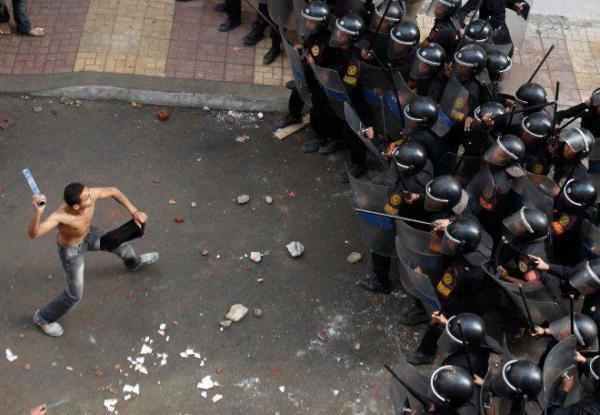
“I want the country to be cleansed” said activist Ahmad Harara, a young dentist in his thirties who lost his right eye in the beginning of the Egyptian Revolution on January 28 and lost his left eye last Saturday, November 19, when he was shot by police snipers. Rooftop snipers have not been seen since last January, but this week they returned, more brutal than ever and backed by military units, to confront the second wave of the revolution.
The story of Harara and hundreds of young Egyptians who are facing bullets bare-chested in Tahrir Square has become a source of inspiration for protesters who are back on the frontlines of battle with brutal security forces to demand regime change all over again . Despite the deteriorating situation in the square, Ahmad Harara displayed a broad smile in a November 21 interview with journalist Yosri Fouda, apparently sensing a shift in momentum in favor of the protesters. “We asked [the SCAF] to cleanse the police, media and judiciary, but they did not respond … We want a country not stalling.”
I participated in the deliberations that took place around the Tahrir Square’s main stage the night Mubarak stepped down (February 11, 2011). As the former president transferred executive authority to the SCAF, protesters were divided into two camps on the question of how to respond to the power transfer. Some called for continued demonstrations until the SCAF had fulfilled the demands of the revolution, while others felt that the SCAF should be given a chance to meet their demands and called on protesters to end their sit-in. Ultimately, the second camp prevailed. However, protesters have since come to the conclusion that leaving the Square before the revolution’s demands were met was a historic mistake. The military will not easily give up the power it has held since 1952, and it now seems that the entrenched interests of the SCAF are in danger of extinguishing the revolution’s dreams. According to Amnesty International, some of the human rights violations perpetrated by the current government are worse than those committed by the former regime.
The current clashes, signaling a renewed determination to fully realize the revolution unmet demands, raises many questions:
Will the elections, scheduled for November 28, be held on time? How dangerous is it to hold elections under the current circumstances with many parties announcing their withdrawal from the electoral race? - How legitimate will the elected parliament be?
How much more will the clashes escalate?
With the bloody confrontations entering their fifth day, the increase in the number of victims and injured (around 33 dead and 2000 injured by November 21) and the spread of protests to over ten governorates, it seems that Egypt’s political crisis has reached the point of no return and the window of opportunity for reaching a political resolution that would allow elections to start on time is rapidly closing.
The speech made on the evening of November 22 by Field Marshal Mohamed Hussein Tantawi, which he formally accepted the resignation of Prime Minister Essam Sharaf’s cabinet and agreed to hand over power by the end of June 2012, failed to appease the protesters in Tahrir Square who are demanding that the SCAF surrender power immediately to a new governing council headed by a civilian, potentially one of the leading presidential candidates or the head of the Supreme Judiciary Council. Some political forces have nominated the presidential candidate Mohamed ElBaradei to form a “national salvation government.” ElBaradei has hinted that he is ready to take on this role, saying that he “would do anything to prevent the country’s fragmentation.”
For the protesters in Tahrir Square, the SCAF has fundamentally lost its legitimacy. In light of all the crimes it has committed, it is clearly time for the military to give up power and form a national salvation cabinet tasked with administering the remainder of the transitional period. However, it appears that leading political forces, including the Muslim Brotherhood, are no longer representing the interests of protesters after they met with Field Marshal Tantawi on November 22 and agreed to his “solution” and timeline for a transfer of power by June 2012. But it is clear that these political leaders do not speak for the protesters in Tahrir Square and do not have the ability to control or disperse them.
While the current clashes represent a dramatic escalation of the military’s repressive tactics, it should be noted that the army has been using excessive force to suppress peaceful protests for months, most recently in the Maspero incident on October 9, which resulted in 27 casualties, mostly Coptic Christians. Whereas the SCAF has been careful to avoid crossing the line of excessive violence in previous confrontations, the military is showing no such restraint in the current clashes. Some have attributed the crackdown to the SCAF’s desire to cancel elections, but is this motivation really powerful enough to prompt a Syrian-style bloodbath?
If the SCAF continues to use excessive force in the face of demands for its overthrow and prosecution, Egypt will likely follow the Syrian example rather than the Tunisian one. In the first round of the revolution, protesters’ forced the regime to meet their core demand: Mubarak’s removal. Will they succeed this time or will the revolution devolve into a Syria-style meltdown, as the military deploys lethal violence in a desperate attempt to retain control?
Magdy Samaan is a freelance journalist and a 2011 MENA Democracy Fellow at the World Affairs Institute.
Photo Credit: Right Now
Image: Bare-chested%20protester.jpg
